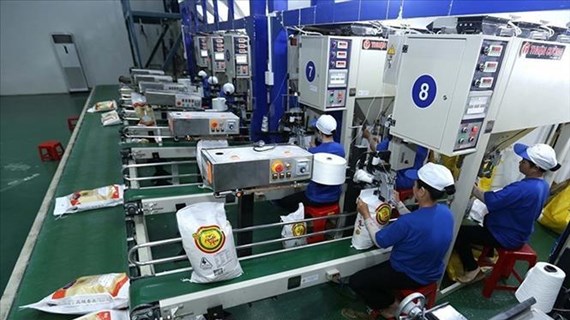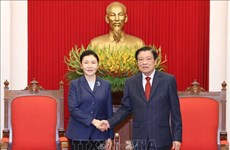NA examine socio-economic situation
NA heard reports on the country’s
socio-economic situation in 2011 and the first quarter of this year.
The National Assembly heard several important reports on the country’s
socio-economic situation in 2011 and the first quarter of this year.
The government’s supplementary report on socio-economic development presented by Deputy Prime Minister Nguyen Xuan Phuc affirmed that in 2011, the economic growth rate was maintained, inflation controlled, the macro economy positively progressed, social welfare was assured, national security and social security were strengthened, and international relations and integration were promoted.
However, the Deputy PM admitted that the macro economy still contained implicit risks and instability. The economy's competitiveness and growth rate were not improved and social labour productivity remained low.
Social services were improved slowly, especially in health care and education. In addition, the environment in areas around rivers, industrial zones and some big cities seriously deteriorated.
In the first quarter of this year, initial positive changes have been recorded. The increase of the Consumer Price Index (CPI) dropped markedly, interest rates decreased, exchange rates stabilised and the balance of trade improved.
Promoting production, trade and investment while continuing to curb inflation, and stabilise macro economic was highlighted by the Deputy PM as the Government's measures to step up the country's stable development.
The Government will restructure and renovate current growth models by increasing the efficiency and competitive edge of the economy, he said.
Social security and welfare will be further improved while environment protection will be promoted, he added.
Synchronising the legal system, streamlining administration procedures, improving State management and promoting the fight against corruption and wastefulness are included in the Government's major task in the coming time.
Enhancing national and social security, improving international relations, and promoting information dissemination to create social consensus are also among the Government's to-do list.
The deputies also listened to an appraisal of the Government's report on socio-economic development and the State budget in 2011 into the first months of this year.
The appraisal was presented by Nguyen Van Giau, member of the NA Standing Committee and chairman of the NA Economic Committee.
The same day, the Minister of Planning and Investment, Bui Quang Vinh, as assigned by the Prime Minister, reported on the general economic restructuring scheme to the NA.
The scheme aligns renovations of the growth model with improving quality, efficiency and competitiveness of the economy, Vinh said.
Most lawmakers agreed that it is essential to restructure the economy as it has recently reflected weaknesses, including slowing economic growth, high inflation, high overseas and public debts, and bad debt on commercial loans.
"The plan's target is to improve the efficiency of financial resources in the economy, raise productivity, and sharpen the competitive edge of the economy," Vinh said.
The restructuring process will be split into two phases: short-term (five years) and long-term. In the five-year period, Vietnam will focus on restructuring public investment, commercial banks and financial institutes, and State-owned groups and corporations.
In the longterm, the country will restructure manufacturing and services, bolster enterprise renovation, and gradually increase competitiveness of products, enterprises and finally the economy.
The restructuring aims to raise the ratio of manufacturing and reduce the proportion of agriculture.
Under the plan, some industries and products will be given priority to make full use of competitive advantages.
The scheme maps out 12 basic solutions to realise the final targets, especially the completion of a market-oriented economy, renovations in investment mechanisms to attract foreign and local enterprises to priority sectors, improvements to human resource quality, and the development of sciences and technologies to bolster competitiveness of the economy.
Nguyen Van Giau, chairman of the NA Economic Committee said that besides the above-mentioned priority services, the Government should consider bolstering the development of e-commerce, soft services, construction and financial services.
Most members of the committee agreed to add social and environmental solutions to the plan to ensure the sustainable development of the economy.
To restructure State-owned enterprises (SOEs), the economic committee recommended building up a transparent management regime to ensure that they use the financial resources effectively, publish information and financial reports periodically, and compete fairly.
For private companies, the restructuring should focus on raising corporate governance capacity, increase transparency of business activities and financial reports, raise capital on the stock market and reduce the great dependence on public investment and commercial loans, Giau said.-VNA
The government’s supplementary report on socio-economic development presented by Deputy Prime Minister Nguyen Xuan Phuc affirmed that in 2011, the economic growth rate was maintained, inflation controlled, the macro economy positively progressed, social welfare was assured, national security and social security were strengthened, and international relations and integration were promoted.
However, the Deputy PM admitted that the macro economy still contained implicit risks and instability. The economy's competitiveness and growth rate were not improved and social labour productivity remained low.
Social services were improved slowly, especially in health care and education. In addition, the environment in areas around rivers, industrial zones and some big cities seriously deteriorated.
In the first quarter of this year, initial positive changes have been recorded. The increase of the Consumer Price Index (CPI) dropped markedly, interest rates decreased, exchange rates stabilised and the balance of trade improved.
Promoting production, trade and investment while continuing to curb inflation, and stabilise macro economic was highlighted by the Deputy PM as the Government's measures to step up the country's stable development.
The Government will restructure and renovate current growth models by increasing the efficiency and competitive edge of the economy, he said.
Social security and welfare will be further improved while environment protection will be promoted, he added.
Synchronising the legal system, streamlining administration procedures, improving State management and promoting the fight against corruption and wastefulness are included in the Government's major task in the coming time.
Enhancing national and social security, improving international relations, and promoting information dissemination to create social consensus are also among the Government's to-do list.
The deputies also listened to an appraisal of the Government's report on socio-economic development and the State budget in 2011 into the first months of this year.
The appraisal was presented by Nguyen Van Giau, member of the NA Standing Committee and chairman of the NA Economic Committee.
The same day, the Minister of Planning and Investment, Bui Quang Vinh, as assigned by the Prime Minister, reported on the general economic restructuring scheme to the NA.
The scheme aligns renovations of the growth model with improving quality, efficiency and competitiveness of the economy, Vinh said.
Most lawmakers agreed that it is essential to restructure the economy as it has recently reflected weaknesses, including slowing economic growth, high inflation, high overseas and public debts, and bad debt on commercial loans.
"The plan's target is to improve the efficiency of financial resources in the economy, raise productivity, and sharpen the competitive edge of the economy," Vinh said.
The restructuring process will be split into two phases: short-term (five years) and long-term. In the five-year period, Vietnam will focus on restructuring public investment, commercial banks and financial institutes, and State-owned groups and corporations.
In the longterm, the country will restructure manufacturing and services, bolster enterprise renovation, and gradually increase competitiveness of products, enterprises and finally the economy.
The restructuring aims to raise the ratio of manufacturing and reduce the proportion of agriculture.
Under the plan, some industries and products will be given priority to make full use of competitive advantages.
The scheme maps out 12 basic solutions to realise the final targets, especially the completion of a market-oriented economy, renovations in investment mechanisms to attract foreign and local enterprises to priority sectors, improvements to human resource quality, and the development of sciences and technologies to bolster competitiveness of the economy.
Nguyen Van Giau, chairman of the NA Economic Committee said that besides the above-mentioned priority services, the Government should consider bolstering the development of e-commerce, soft services, construction and financial services.
Most members of the committee agreed to add social and environmental solutions to the plan to ensure the sustainable development of the economy.
To restructure State-owned enterprises (SOEs), the economic committee recommended building up a transparent management regime to ensure that they use the financial resources effectively, publish information and financial reports periodically, and compete fairly.
For private companies, the restructuring should focus on raising corporate governance capacity, increase transparency of business activities and financial reports, raise capital on the stock market and reduce the great dependence on public investment and commercial loans, Giau said.-VNA












